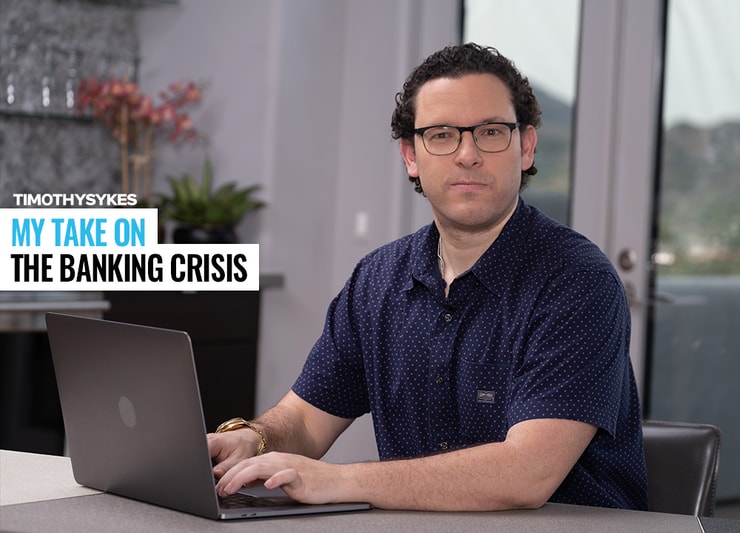Over the last few days, I’ve been bombarded with questions regarding the regional banking crisis.
And if you’ve been following me on social media, you know I’ve been sounding the alarm.
As someone who has traded through the dot com bubble and the 2008 financial crisis, I can tell you what we’re experiencing in the markets right now isn’t anything new.
But that doesn’t mean it’s not scary.
Some traders will get wiped out, while others will come out in an even stronger position.
Here’s what I’ve been telling my students…
Table of Contents
Don’t Step In Front of a Freight Train

Unless you have a direct line to the Fed or FDIC, you’re just guessing how things will turn out.
In March of 2008, Bear Sterns collapsed.
You can find an old video on YouTube of Jim Cramer telling folks that Bear Sterns was fine and not to take their money out.
But despite the collapse of Bear Sterns, the market kept on ripping higher up until the collapse of Lehman Brothers, which was in September of 2008.
Again, before Lehman’s collapse, everyone said the bank was fine. Even employees were surprised when it went under.
You saw how quickly SVB Financial Group (SIVB) and Signature Bank (SBNY) lost market value…
Many of these regional banks look “cheap” right here.
But how do you really know?
Things could get significantly worse before they get better.
One of your most important roles as a trader is to preserve capital.
That’s why my number #1 rule is to cut losses quickly.
And while I won’t be surprised if we see some monster bounces in some of these banking stocks, it just seems like you’re stepping in front of a freight train.
This is not the time to try to be a hero.
I Would Rather Miss A Bounce And Be Overly Safe

I like trading easy and predictable setups. People on social media often tease me about that. They ask me when I will trade “real” stocks and why I don’t trade bigger…
Profits are profits.
Whether you make them from trading sophisticated options strategies or penny stocks…the money looks the same in your trading account.
You don’t get bonus points for making trading harder.
I prefer to be cautious and trade setups that have brought me success in the past.
A week from now, these bank stocks could be trading significantly higher. But what if they’re not?
If I’m going to lose money trading, I want to lose it from trading my best setups.
The Only Thing We Can Control Is Our Risk

The idea of set-it-and-forget-it investing is so appealing. Buy some stocks, let them do their thing, and you’re rich.
However, it never seems to work out that way.
Usually, what happens is investors panic during a sell-off and get crushed. That’s why investing in individual stocks is so hard.
Meanwhile, day-trading penny stocks may appear riskier. But at the end of the day, your account is in cash. In other words, you don’t have overnight risk.
Sure, it requires you to learn new skills.
And it takes time to learn them.
However, you can sleep much safer at night, not worrying about the next shoe to drop.
Moreover, you come into each trading day fresh and ready to attack any opportunity you see. If you have a portfolio and your positions are down significantly, you’re more likely to trade with hesitancy.

The banking sector has ties to the entire economy.
For example, if large companies can’t get access to their funds, then they can’t pay their employees.
The ripple effect is massive.
On Monday morning, ETSY (ETSY) said the company had payment issues related to the Silicon Valley Bank collapse, impacting a small group of sellers.
The regional banking crisis impacted asset managers like Schwab Corp (SCHW) and American International Group (AIG) insurers.
The spillover can be far and wide.
But if you trade uncorrelated assets like penny stocks, you can avoid much of the mess we see in the market.
It’s what I teach my students to trade.
AWESOME new post about @Jackaroo_Trades by @BusinessInsider so it's a good time to review blog posts like https://t.co/PYdx4fCgJE and https://t.co/kFzYcJ4epX and videos like https://t.co/9dWFKI7hfv and https://t.co/rkRcPNNxSG and https://t.co/1Euio3lWyD… https://t.co/W2HDdJCvOj pic.twitter.com/CBC614O3x4
— Timothy Sykes (@timothysykes) March 13, 2023
One of my top students, Jack Kellogg, has taken my teachings and developed his own trading style.
One of the big misconceptions is that if you want to make money in the stock market, you have to trade the stuff they write about in the newspapers and talk about on TV.
I’ve made over $7.4 million trading stocks that most people have never heard of before.
And like I said earlier, you don’t get bonus bucks for trading popular stocks.
Bottom Line

I hope this regional banking crisis gets resolved soon. It would hurt a lot of small businesses, which is not fair, considering they were not the ones who did anything wrong.
The last thing we want is for people to lose faith in our banking system.
At the same time, now is not the time to try to be a hero.
Stay safe out there, and be cautious.
If you’re tired of buy-hold-and-pray investing and want to give trading a shot, then I invite you to check this out…


Leave a reply